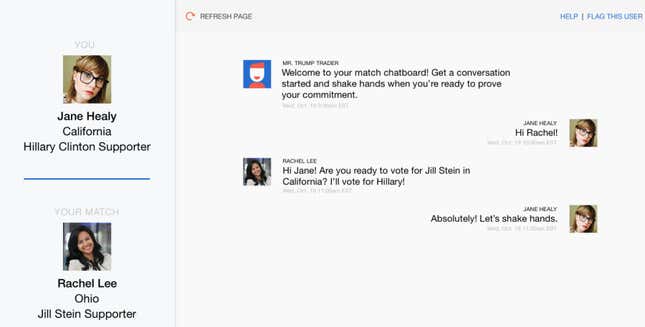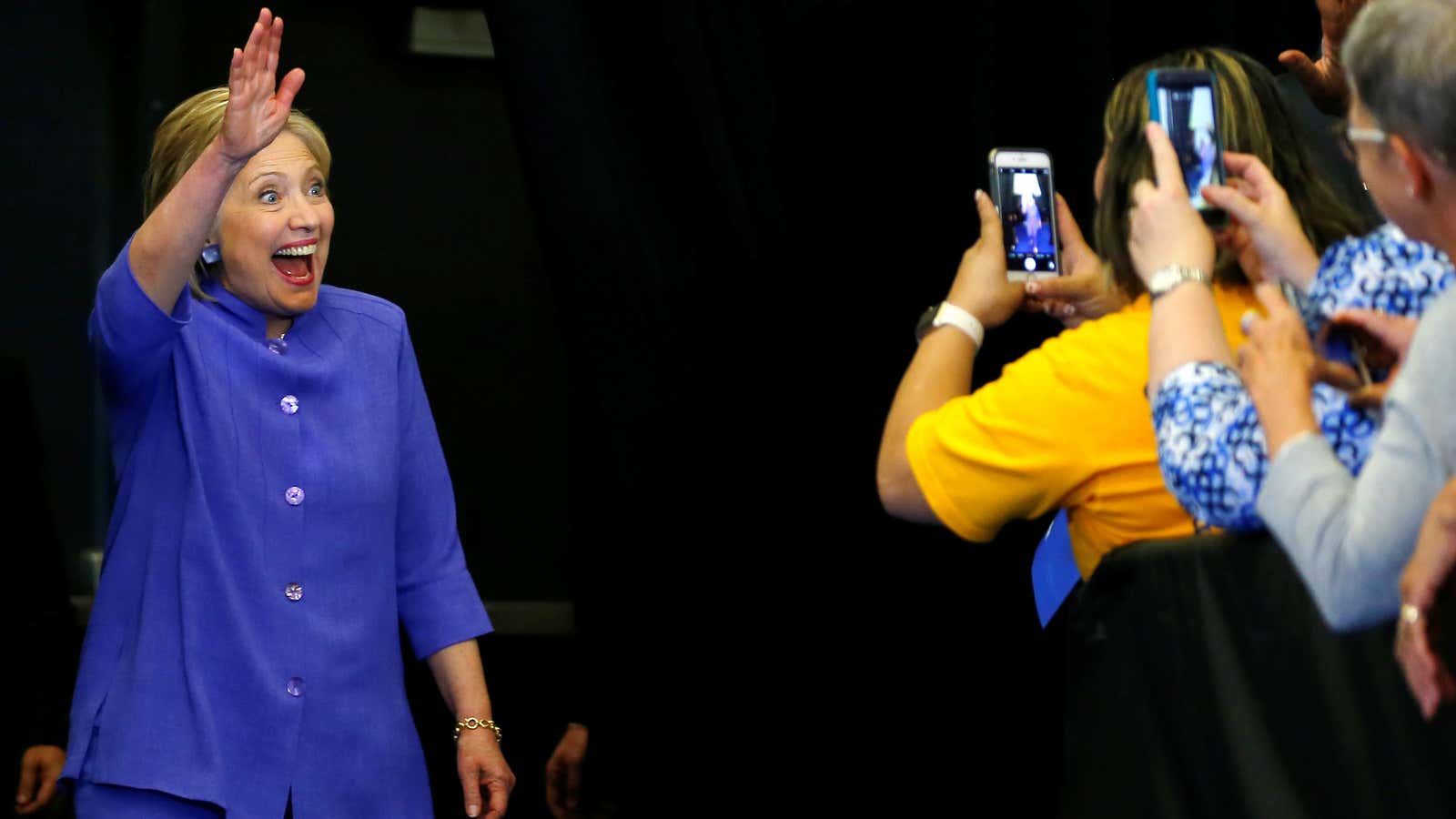Marc Baluda almost always votes Republican. This year, however, he’s casting his ballot for Jill Stein.
It’s not that Baluda, who is registered as an Independent, personally supports Stein, the Green Party’s nominee for president. In fact, the 44-year-old Bay Area attorney is gunning hard for Hillary Clinton to win the presidency, because he thinks Donald Trump “represents a threat to America itself, to democracy, and American values.”
But he’s still a staunch fiscal conservative. So why is he casting a vote for the darling of the remotest left wing?
When Baluda votes for Stein he’ll actually be voting on behalf of Sophie Warner, a 20-year-old biology student in Ohio. She, in turn, will be pulling the lever for his preferred candidate, Clinton, at her Cleveland Heights poll station. In other words, the two have traded votes.
The two found each other and pledged to vote on each other’s behalf on an online platform called TrumpTraders.org. “We’ll match you to voters in other states to ensure everyone gets a say and Trump doesn’t win,” reads the tagline of the site, which was founded by two former officials from the George W. Bush administration, one of whom is also a former Tesla executive.

TrumpTraders.org facilitates vote trading, citizens swapping votes in order to achieve a shared goal—in this case, keeping Trump out of the White House.
The reason this might be necessary is twofold: the US’s electoral college, and its two-party system.
The national popular vote doesn’t decide the election. Instead, 538 electoral votes are divvied up among the states based roughly on their populations. In all but two of the states—Maine and Nebraska—whichever candidate wins a state’s popular vote gets all of its electoral votes. (In the two outliers, the votes are allotted to each congressional district.)
The vast majority of states tend to vote consistently in favor of one of the two main parties. The handful that don’t are the swing states—and the voters who live there wield disproportionate power over America’s fate.
Ohio, where Warner lives, has traditionally been the most important of swing states. In 28 of the last 30 presidential contests, the candidate who won Ohio also won the nation. Its elections tend to be squeakers. In 2012, Barack Obama edged out Republican Mitt Romney by 116,214 votes, a relative sliver of the nearly 5.5 million total votes cast in Ohio.
With elections so close, voting for a third-party candidate risks helping put Trump in office. In the 2000 Florida election, nearly 98,000 mostly left-leaning voters passed over Democrat Al Gore to vote for Ralph Nader, the more liberal Green Party candidate. Bush wound up beating Gore by only 537 votes in the state.
This is precisely the dilemma Warner faces in Ohio. Though she tends to prefer Green Party candidates, “they don’t really have a fair chance, so instead it would be better to strategically vote for someone who would,” she says.
California is one of the states that epitomizes “safe state.” Democratic presidential candidates consistently win California, and by increasingly huge margins. In 2012, 3 million more Californians voted for Obama than for Romney, out of nearly 12.7 million ballots cast.
With Clinton currently clocking a 99% chance of winning California, Baluda’s vote won’t put her any closer to the White House. Swapping votes with Warner just might. For Baluda, this isn’t just expedient; it’s also empowering.
“The candidates [exploit] the electoral college however they want—they focus their campaign efforts on winning swing states. Why can’t voters?” he says. “The answer is, of course they can. But they need a mechanism for doing that. And now [using platforms like TrumpTraders.org] they have one.”
It’s a race against time to make much of an impact. TrumpTraders.org has only been up and running for a couple of weeks. As of this morning, more than 15,000 people had swapped votes, says John Stubbs, who cofounded both TrumpTraders.org and R4C16, a site organizing Republicans for Clinton.
It’s not the only game in town. For instance, MakeMineCount.org (“Everybody wins. Except Trump”) facilitates vote-swapping too, specifically targeting “frustrated progressive Bernie supporters.” It’s also not an entirely new idea. NaderTraders sprouted up to help Gore in 2000. More successfully, a “strategic voting” movement in Canada organized voters into “progressive voting blocs” and helped Liberal Justin Trudeau upset Stephen Harper’s Conservatives in what the media called a “shock election.”
In a way, there’s a “silver lining” to Trump’s ascension, says Stubbs—bringing together diverse swaths of America that seldom have cause to talk to each other.
“I am now talking to supporters of Jill Stein and Gary Johnson, and we are talking together about how to beat Trump—that’s the first step,” he says. “Maybe then we can talk about how to deal with immigration, or climate change, or criminal justice reform. It’s about breaking down the blue versus red barriers, putting country ahead of party.”
Not that Warner is going to catch the fiscal conservatism bug, or Baluda will go Green. Still, Baluda reports feeling something a little unexpected since he agreed to swap votes. ”I was driving the other day [in Berkeley] and saw signs for Jill Stein and I thought, ‘There she is—that’s my candidate.'”
Update, Nov. 4, 2016, 9:20am ET: The post has been updated to reflect the latest available TrumpTraders.org user volume.
